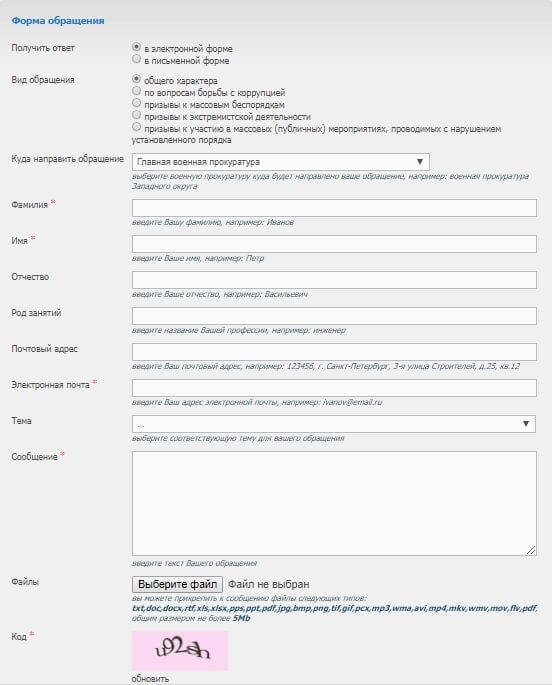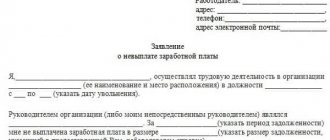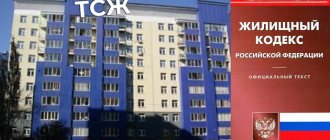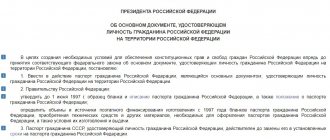How to submit
Unlike an application, a complaint to the military prosecutor's office is filed in situations where the applicant is not sure that the identified fact is a crime or violation. This can be done in any available way:
- By a letter of notification sent to the address K-160, 119160, Moscow, lane. Kholzunova, 14. You can get information about filed claims by calling; +7 (495) 693-63-46;;; +7 (499) 973-63-33;. A citizen can also contact the head of the district level at the address indicated on the website page https://gvp.gov.ru/struct/vpo/.
- Call the helpline. In this case, you should briefly describe the essence of the problem and indicate your data.
- Bring a written appeal to the reception, which is carried out by the prosecutor's reception staff at the address: Moscow, lane. Kholzunova, house 16. Reception days: Mon. - even 9-18.00, on Friday – until 16.45. Lunch break from 13.00 to 13.45. No prior appointment is required.
- Through the online reception on the website https://gvp.gov.ru/recept/.
Form for submitting a written complaint
The complaint may be submitted in writing, handwritten or printed using any printing (office) technology. The rules for submitting documents must be observed in accordance with GOST R 6.30 -2003.
Sample complaint to the military prosecutor's office:
The presented sample was compiled in violation of GOST requirements . The application must include your full name. Chief Military Prosecutor, military and special ranks: Petrov Valery Georgievich, State Counselor of Justice 1st class, Colonel General. Or, similar data of the person in whose name the complaint is being filed.
Compilation rules
Before writing a document, it would be a good idea to seek advice from a lawyer or study the current legislation to determine whether the misconduct identified by the military personnel is an offense. Otherwise, this can lead to serious consequences, especially if it is determined that the facts given are not true.
Attention, if it is established that the complaint contained deliberately unreliable (false) information, the author may be charged the costs incurred by the Prosecutor's Office in connection with its consideration.
The claim must be drawn up in compliance with the following requirements:
- the information provided must be fully reasoned and, if possible, supported by evidence;
- The text should not contain offensive or obscene language. The submitted document will remain unanswered if it also contains threats to the health, property or life of any official or members of his family;
- Abuse of the right to appeal to government agencies is not allowed, especially since administrative liability is provided for this;
- supervisory authorities do not accept any applications from anonymous persons, therefore the applicant’s signature must appear after the text;
- if the claim contains issues that cannot be resolved by the supervisory authority (due to the lack of relevant competence), the document will be sent to the body or specific official who is authorized to make decisions on such applications.
Procedure for compilation
The complaint can be drawn up in any form according to the sample, since the law does not provide for the use of standard forms for such applications. It is preferable that this be a printed text, otherwise there may be problems with studying the document, which is especially important for applicants with illegible handwriting.
In the upper right corner of the document you must indicate the recipient of the claim and your full data without abbreviations or inaccuracies. Just below in the center is written the word “Complaint”, after which the essence of the problem is stated. The style of its description should be concise and formal. The use of emotional retreats is not allowed, as this is not constructive.
The text must describe the specific situation, indicating the dates, names and positions of the parties to the conflict.
The final part of the document is a petition, which should be separated into a separate paragraph. It should begin with the word “Please,” after which you can state your wishes and requirements.
At the end, the date must be indicated, and in conclusion, the citizen signs the document and indicates his full name (with the obligatory decoding of the initials). The date of signature may not coincide with the date of submission of the application, even if it is handed over to the authorized person at a personal reception.
Attention! Any response involves taking action that may have serious consequences. In this regard, you should contact the Military Prosecutor's Office only in extreme cases.
Online via Internet reception
In order to exercise the legal right of Russians to appeal, a separate section “Internet reception” operates on the official website of the supervisory authority, which can be used to file a complaint online.

To do this, you will need to fill out a form with the following information:
- how the response will be delivered. In the “Get a response” item, select the appropriate option (in electronic or written form);
- view. The complaint may be of a general nature, or may relate to issues of combating corruption, calls for extremist activities and mass riots, as well as participation in events that are held in violation of the established order;
- where to send a message. You need to select the addressee of the complaint from the drop-down menu. If necessary, you can contact directly the military unit where the offense was committed;
- personal and contact information (full name, occupation, postal address, email address);
- a topic that should be selected from the drop-down menu (for example, “On violation of the rights of military personnel”). If the applicant does not know which topic is best to choose, then this field can be left blank;
- the text of the message, which should briefly describe the current situation, indicating the facts, circumstances and officials who are participants in the incident. If possible, you can refer to the rules of law that were violated.
To prevent an electronic complaint from appearing unfounded, you can attach files to it that can be used as evidence of an offense or crime. The total volume of attachments should not exceed 5 MB.
To complete the operation, enter the verification security code “captcha” and click the “Submit” button. After this, information will appear about the successful submission of the complaint and the assignment of a registration number to it.
Important! If the applicant chooses an email as a method of receiving a response, then when filling out the form he will not have to indicate his mailing address. And vice versa.
Sample application to the military prosecutor's office
To the military prosecutor's office Address: ________________________ From: ________________________ Address: ________________________
Statement ________________ year I was given a warning about the inadmissibility of violating the law. As a result, I was charged with Part 1 of Art. 332 of the Criminal Code of the Russian Federation, namely, failure by a subordinate to comply with an order from a superior given in the prescribed manner, which caused significant harm to the interests of the service. However, I don't agree with this. I am doing military service under a contract in __________, stationed in the city of ____________ Moscow Region as a commander of a __ training platoon __ training company - teacher. __________ year, the commander of the military unit called me to him and explained that he had received a telephone message from the chief of staff of the ___________ military district ___________ from __________, according to which the chief of ___________ is obliged to second me for the period from _________ to ____________ at the disposal of the commander of the military unit _______ in the 185 TC BP Air Force "________". I immediately explained that I have a wife and that she is currently in her third month of pregnancy. She is currently undergoing intensive treatment due to deteriorating health and needs constant care. She also constantly needed medications, which were not available in the hospital; I had to ensure a quick supply of medications. The health condition of my wife and child was quite bad, about which I provided the relevant documents. However, no one listened to me. In accordance with Art. 28.6 of the Federal Law “On the Status of Military Personnel”: 1. When a serviceman or citizen called up for military training is subject to disciplinary liability, the following are subject to clarification: the event of the disciplinary offense (time, place, method and other circumstances of its commission); the person who committed the disciplinary offense; the guilt of a serviceman or a citizen called up for military training in committing a disciplinary offense, the form of guilt and the motives for committing a disciplinary offense; data characterizing the personality of a serviceman or citizen called up for military training who has committed a disciplinary offense; the presence and nature of the harmful consequences of a disciplinary offense; circumstances excluding disciplinary liability of a serviceman or citizen called up for military training; circumstances mitigating disciplinary liability and circumstances aggravating disciplinary liability; reasons and conditions that contributed to the commission of a disciplinary offense; other circumstances relevant for the correct resolution of the issue of bringing a serviceman or citizen called up to military training to disciplinary liability. 2. Evidence when bringing a serviceman or citizen called up to military training to disciplinary liability is any factual data on the basis of which the commander or judge of a military court considering materials about a disciplinary offense establishes the presence or absence of the circumstances specified in paragraph 1 of this article. 3. The following are allowed as evidence: explanations of a serviceman or citizen called up for military training and subject to disciplinary liability; explanations of persons who know the circumstances that are important for the correct resolution of the issue of bringing a serviceman or citizen called up to military training to disciplinary liability; conclusion and explanations of a specialist; documentation; indications of special technical means; evidence. 4. Explanations of a serviceman or citizen called up for military training who is brought to disciplinary liability, explanations of persons who know the circumstances that are important for the correct solution of the issue of bringing a serviceman or citizen called up for military training to disciplinary liability, constitute information that has attitude towards resolving the issue of bringing a serviceman or citizen called up to military training to disciplinary liability, and are communicated by these persons orally or in writing. Explanations of these persons, if necessary, are recorded and attached to the materials on the disciplinary offense, and are also reflected in the protocol on gross disciplinary offense or in another protocol provided for by this Federal Law. 5. The conclusion of a specialist - a person with special knowledge in science, technology, art or craft, represents his judgment expressed in writing within the limits of his professional competence in accordance with the questions posed. The specialist’s explanations represent information about circumstances requiring special knowledge, as well as an explanation of his opinion, and are communicated by the specialist orally or in writing. 6. Documents are recognized as evidence if the information stated or certified in them by organizations, officials or citizens is important for resolving the issue of bringing a serviceman or citizen called up to military training to disciplinary liability. Such documents may include: protocols; certificates (acts) of medical examination; materials of audit, inspection, administrative investigation; performance characteristics of a serviceman or citizen called up for military training and subject to disciplinary action; other documents. 7. The readings of special technical means, that is, measuring instruments approved in the prescribed manner as measuring instruments, having the appropriate certificates and having passed metrological verification, are reflected in the protocol on gross disciplinary offense or in another protocol provided for by this Federal Law, and if necessary are recorded and attached to the materials about the disciplinary offense. 8. Material evidence when deciding whether to bring a serviceman or a citizen called up to military training to disciplinary liability means objects of a disciplinary offense or objects used in its commission, or objects that have retained traces of a disciplinary offense. Physical evidence, if necessary, is photographed or recorded in another established way and attached to the materials about the disciplinary offense. The presence of material evidence is recorded in the protocol on a gross disciplinary offense or in another protocol provided for by this Federal Law, or in other materials on the disciplinary offense. Material evidence is stored in the manner established by general military regulations. 9. The commander or judge of a military court considering materials about a disciplinary offense is obliged to take the necessary measures to ensure the safety of material evidence and documents before making a decision based on the results of considering materials about a disciplinary offense. When a commander or judge of a military court considering materials about a disciplinary offense makes decisions based on the results of consideration of these materials, the issue of seized items and documents must be resolved. At the same time: things and documents that are not withdrawn from circulation are subject to return to their legal owner, and if it is not established, they are transferred to the ownership of the state in accordance with the legislation of the Russian Federation; items withdrawn from circulation are subject to transfer to the appropriate organizations or are destroyed; documents that are physical evidence remain in the materials on the disciplinary offense for the entire period of storage of these materials or are transferred to interested parties in accordance with the legislation of the Russian Federation; confiscated orders, medals, breastplates for honorary titles of the Russian Federation, RSFSR and USSR are subject to return to their legal owner, and if it is not established, transferred to the Administration of the President of the Russian Federation. Disputes about the ownership of material evidence are resolved through civil proceedings. 10. The commander or judge of a military court considering materials about a disciplinary offense evaluates the evidence according to his inner conviction, based on a comprehensive, complete and objective study of all the circumstances of the commission of a disciplinary offense in their totality. No evidence can have predetermined validity. The use of evidence obtained in violation of this Federal Law and other federal laws is not permitted. In accordance with Article 22 of the Federal Law “On the Prosecutor's Office of the Russian Federation”, the Prosecutor, when performing the functions assigned to him, has the right: upon presentation of his official identification, freely enter the territories and premises of the bodies specified in paragraph 1 of Article 21 of this Federal Law, have access to their documents and materials, check the implementation of laws in connection with information received by the prosecutor's office about facts of violation of the law; demand from heads and other officials of these bodies the submission of necessary documents, materials, statistical and other information; assigning specialists to clarify issues that have arisen; conducting inspections based on materials and appeals received by the prosecutor's office, auditing the activities of organizations controlled or subordinate to them; call officials and citizens for explanations regarding violations of laws. 2. The prosecutor or his deputy, on the grounds established by law, initiates proceedings for an administrative offense, demands that persons who have violated the law be brought to other liability established by law, and warns against the inadmissibility of violating the law. 3. The prosecutor or his deputy, in the event of a violation of the law by the bodies and officials specified in paragraph 1 of Article 21 of this Federal Law: releases by his resolution persons illegally subjected to administrative detention on the basis of decisions of non-judicial bodies; protests legal acts that contradict the law, applies to a court or arbitration court with a demand to recognize such acts as invalid; makes a proposal to eliminate violations of the law. 4. Officials of the bodies specified in paragraph 1 of Article 21 of this Federal Law are obliged to begin fulfilling the requirements of the prosecutor or his deputy to conduct inspections and audits immediately. By virtue of Art. 30 Federal Law “On the Prosecutor's Office of the Russian Federation”: The powers of the prosecutor to supervise the implementation of laws by bodies carrying out operational investigative activities, inquiry and preliminary investigation are established by the criminal procedural legislation of the Russian Federation and other federal laws. 2. The instructions of the Prosecutor General of the Russian Federation on questions of inquiry that do not require legislative regulation are binding. In accordance with Art. 27 “On the Prosecutor's Office of the Russian Federation”: 1. When performing the functions assigned to him, the prosecutor: considers and verifies applications, complaints and other reports of violations of human and civil rights and freedoms; explains to victims the procedure for protecting their rights and freedoms; takes measures to prevent and suppress violations of human and civil rights and freedoms, bring to justice those who violated the law, and compensate for the damage caused; uses the powers provided for in Article 22 of this Federal Law. 2. If there are grounds to believe that the violation of human and civil rights and freedoms has the nature of a crime, the prosecutor takes measures to ensure that the persons who committed it are subject to criminal prosecution in accordance with the law. 3. In cases where the violation of the rights and freedoms of man and citizen is in the nature of an administrative offense, the prosecutor initiates proceedings on an administrative offense or immediately transmits a report of the offense and inspection materials to the body or official authorized to consider cases of administrative offenses. 4. In case of violation of the rights and freedoms of man and citizen, protected in civil proceedings, when the victim, for health reasons, age or other reasons, cannot personally defend his rights and freedoms in court or arbitration court, or when the rights and freedoms of a significant number of citizens are violated or due to other circumstances the violation has acquired special public significance, the prosecutor files and supports a claim in court or arbitration court in the interests of the victims. In accordance with Article 194 of the Labor Code of the Russian Federation: If within a year from the date of application of the disciplinary sanction the employee is not subject to a new disciplinary sanction, then he is considered to have no disciplinary sanction. The employer, before the expiration of a year from the date of application of the disciplinary sanction, has the right to remove it from the employee on his own initiative, at the request of the employee himself, at the request of his immediate supervisor or a representative body of employees. Based on the above and guided by current legislation:
ASK
1) Assist in canceling the warning about the inadmissibility of violating the law. 2) Respond in writing within the time limits established by law.
"___"_____________ G. _____________
Procedure and terms of consideration
All appeals containing data on violations of current legislation (the rights and interests of citizens, the state, etc.) and the documents attached to them, received both orally and in writing, are subject to registration in the accounting book.
Complaints received by telephone are recorded in protocols for receiving telephone messages and are duplicated in the accounting book.
A preliminary study of the essence of the problem is first carried out by the reception office of the Main Military Prosecutor's Office.
If the applicant incorrectly indicated the structural unit, then within 3 days the submitted claim must be forwarded to its destination on the basis of a reasoned resolution (certificate).
A complaint may be ignored if:
- the applicant incorrectly indicated his personal or contact information;
- the text of the document does not contain a descriptive part indicating the facts and participants in the incident;
- The citizen described the current situation in a chaotic manner, making it difficult to form an idea of what the offense he indicated was.
In this case, the application may be sent for reconsideration if the identified errors are promptly eliminated and a new test of the application is drawn up.
The review period is calculated from the moment of registration of the document and cannot be more than 30 days. But when additional verification, request for materials and obtaining other evidence is necessary, the period for making a decision can be extended by the military prosecutor or his deputy for another 30 days, of which the person who filed the appeal must be notified.
Functions of a law enforcement agency
The prosecutor's office is one of the most important supervisory government bodies that monitors citizens' compliance with domestic legislation, and also protects their legal rights and interests. If an offense is detected, immediate criminal and administrative liability must be imposed.
The main function of the body is to organize inspections, initiate and consider criminal cases, as well as other actions falling under the jurisdiction of this organization, among which are the following:
- supervision of the activities of other law enforcement agencies;
- control over compliance with legislative norms by federal authorities;
- control over compliance with the rights and interests of Russians.
Getting a response
Upon expiration of the consideration period, the applicant must receive a response from the supervisory authority in the method previously chosen by him. The documents attached to the claim are also returned to him, copies of which, if necessary, are attached to the supervisory proceedings.
In case of refusal to satisfy the claim, the Military Prosecutor's Office must give a meaningful response with an assessment of all the arguments presented, and also explain how you can appeal the decision.
Regardless of the decision made, Instruction No. 45, which determines the procedure for considering claims, prohibits the prosecution of an applicant who has criticized certain officials, pointed out the non-compliance with someone’s rights, interests and freedoms, or revealed the fact of an offense.
What is a military prosecutor's office?
The Military Prosecutor's Office is one of the divisions of the Prosecutor General's Office of Russia, which oversees the implementation of laws in the bodies of the Armed Forces of the Russian Federation. The military prosecutor's office includes various other departments that provide control over order in individual regional departments of the armed forces.
The military prosecutor's office controls:
- Execution of laws;
- Respect for the rights of the military;
- Provides legal protection for military family members and other citizens working in the military structure;
- Inspects officials, etc.
The legislative framework
To contact the Military Prosecutor's Office, you can be guided by the following legislative acts.
- Federal Law "On the Prosecutor's Office of the Russian Federation" No. 2202-1-F dated January 17, 1992. (as amended on July 29, 2017).
- Federal Law “On the status of military personnel” No. 76-FZ dated May 27, 1998. (ed. 07/01/2017).
- Federal Law “On the procedure for considering appeals from citizens of the Russian Federation” No. 59-FZ dated May 2, 2006.
- Instruction on the procedure for considering applications and receiving citizens in the prosecutor's office of the Russian Federation No. 45 dated January 30, 2013.
- Instruction on the procedure for considering applications and receiving citizens in the military prosecutor's office of the Russian Federation No. 70 dated March 18, 2013.
Important Features
Before sending a complaint or application to the prosecutor's office, the following should be considered:
- Clearly indicate which rights were violated and how.
- You can contact the military prosecutor's office only if a violation actually existed.
- Information about the violator must be accurate and truthful, otherwise the statement will be classified as a deliberately false report.
Not all applications are accepted for consideration, so it is very important that it is made in the proper form, has a justification, and a clear description of the violation of your rights. If you doubt that you can write a siltation complaint to the prosecutor’s office yourself, contact a specialist.
The document may be returned for revision within 7 days ; this happens in cases where the complaint does not contain the necessary information. In order not to make a mistake, it is better to use a ready-made complaint sample, where you can enter the necessary data. You can download it on our website.










